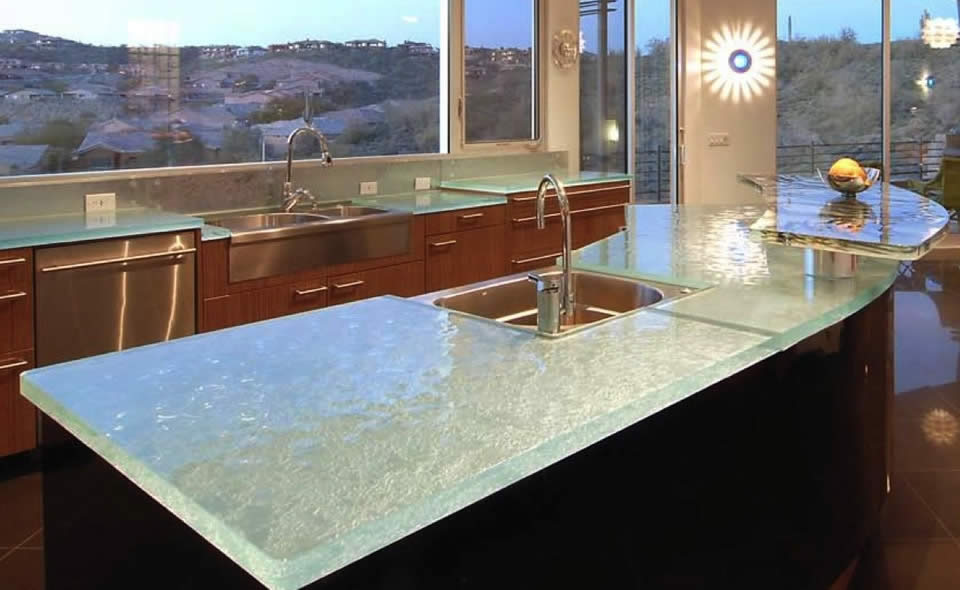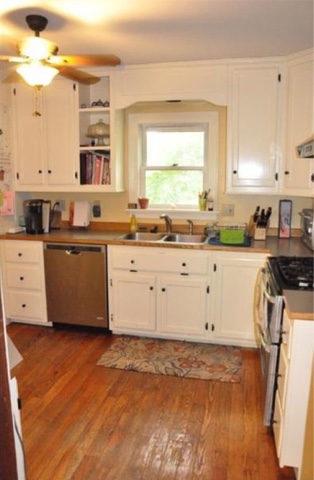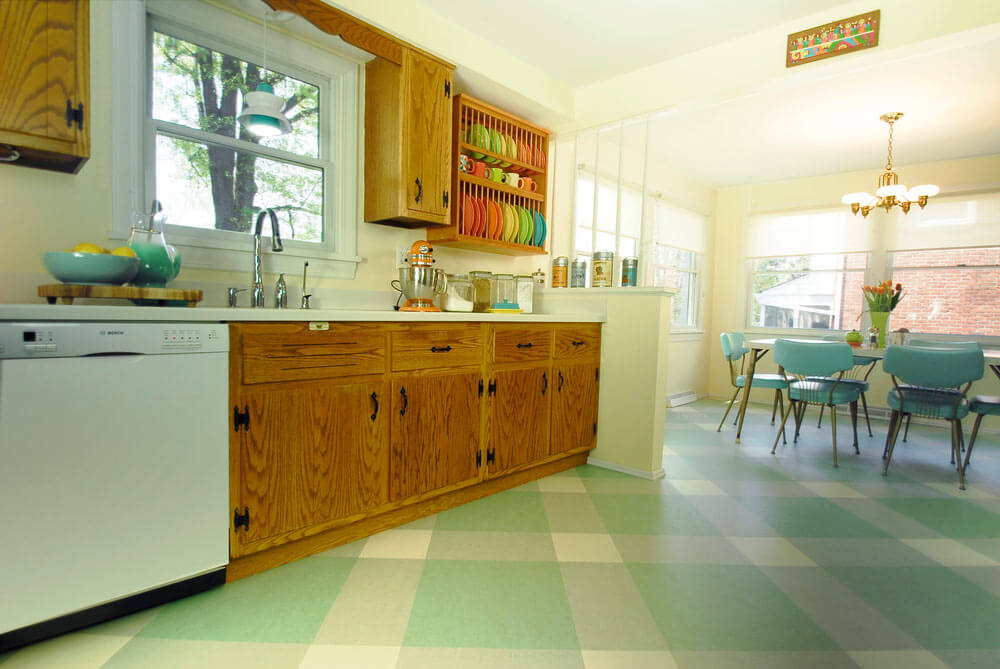Linoleum kitchen countertops are an increasingly popular choice for homeowners looking to combine style, affordability, and sustainability. Linoleum has been used for decades in various applications, primarily as a flooring material, but its properties make it suitable for countertops as well. Linoleum is made from natural materials such as linseed oil, wood flour, cork dust, and mineral fillers, which makes it an environmentally friendly option. In addition to its sustainability, linoleum is non-toxic and has natural antimicrobial properties, which make it ideal for food preparation surfaces. It’s a versatile choice that can suit a variety of kitchen designs, from traditional to contemporary and comes in a range of colors and patterns.
One of the primary reasons people choose linoleum for kitchen countertops is its eco-friendliness. Unlike many synthetic countertop materials, linoleum is made from renewable resources and is biodegradable. This makes it a good choice for those looking to minimize their environmental footprint. Linoleum’s low impact on the environment is further enhanced by its long lifespan. With proper maintenance, linoleum countertops can last for decades, and when they eventually need to be replaced, they break down more easily than other materials, contributing less waste to landfills.

Linoleum also offers a unique aesthetic that’s difficult to replicate with other materials. It has a warm, matte finish that creates a soft, welcoming look in the kitchen. Unlike glossy surfaces that can show fingerprints and smudges, linoleum’s matte surface is low-maintenance in terms of appearance. Linoleum countertops are available in a variety of colors, from subtle neutrals to bold, vibrant hues. This flexibility allows homeowners to experiment with different styles and color schemes, making linoleum a suitable choice for both minimalist and colorful kitchens.
One notable feature of linoleum is its durability. While it may not be as hard as stone or engineered materials like quartz, linoleum is still quite resilient. It’s naturally resistant to scratches and dents, though care should be taken to avoid sharp objects directly on the surface. Unlike some other materials that can chip or crack, linoleum is more forgiving when it comes to impacts, as it has a slight give that absorbs shock. However, it’s still a good idea to use cutting boards and trivets to protect the surface from sharp tools and hot cookware.

In terms of maintenance, linoleum countertops are relatively easy to care for. They only require regular cleaning with mild soap and water to keep them looking their best. Avoiding harsh chemical cleaners is important, as these can damage the surface over time. Linoleum does benefit from periodic waxing, which enhances its natural water resistance and gives it a fresh look. This simple maintenance routine makes linoleum an attractive option for those who want a countertop material that doesn’t require constant upkeep or special cleaning products.
One potential drawback of linoleum is that it can be prone to staining if not properly sealed and maintained. Since it’s a porous material, spills should be wiped up promptly to prevent liquids from seeping into the surface. When installed as a countertop, linoleum should be sealed to provide an additional layer of protection against stains. This sealing process can help reduce the risk of staining while also enhancing the material’s water resistance. With proper sealing and care, linoleum can remain in good condition for many years.

Linoleum is also heat-resistant to a certain extent, though it’s not as heatproof as stone or metal surfaces. It can handle moderately hot items without damage, but direct contact with hot pots and pans should be avoided to prevent discoloration or warping. Using trivets or heat-resistant mats for hot items is recommended to maintain the countertop’s appearance. While linoleum can withstand occasional heat, consistent exposure to high temperatures can cause the surface to deteriorate faster.
Installation is another factor where linoleum countertops offer an advantage. Linoleum can be installed over various types of sub-surfaces, making it a versatile choice for remodels and renovations. The material can be custom-cut to fit countertops of various shapes and sizes, which makes it easier to install compared to more rigid materials like granite. For those with DIY skills, linoleum countertops can even be a possible project, though professional installation is recommended to ensure a smooth, durable surface.
The cost of linoleum countertops is another reason they appeal to budget-conscious homeowners. Linoleum is generally less expensive than natural stone, quartz, or even some laminate options. Its affordability, combined with its durability and easy maintenance, makes it a cost-effective choice for those looking to renovate their kitchen without a substantial investment. When considering the overall value, linoleum offers a balance of aesthetics, performance, and sustainability at a relatively low price point.

Linoleum’s antimicrobial properties are also a benefit in kitchen environments. Linseed oil, one of the main components of linoleum, naturally inhibits the growth of bacteria, mold, and mildew. This makes linoleum a hygienic choice, especially for food preparation areas. While it’s still important to clean the countertop regularly, linoleum’s antimicrobial properties add an extra layer of protection, making it a great option for households where hygiene is a top priority.
Another benefit of linoleum is that it’s a comfortable material to work on. Unlike stone or metal surfaces, which can feel cold and hard, linoleum has a slight softness to it. This gives it a warmer, more comfortable feel underhand, which can be particularly pleasant for those who spend long hours in the kitchen. The slight flexibility of linoleum can make it more comfortable for activities like kneading dough or chopping vegetables, as it’s less likely to strain wrists and arms than harder surfaces.
For those seeking a vintage or retro look, linoleum is a perfect match. Its use as a flooring material in the mid-20th century has given linoleum a nostalgic quality, making it popular in retro kitchen designs. Paired with vintage-inspired cabinetry and fixtures, linoleum countertops can add to a kitchen’s retro charm. But linoleum can also be adapted to contemporary styles, especially when used in sleek, minimalist designs or in bold colors.

Linoleum is a versatile material in terms of customization as well. Beyond its range of colors, linoleum can be cut and formed to include integrated backsplashes or rounded edges, which can help create a seamless, cohesive look in the kitchen. Edges can be finished in a variety of ways, from beveled to rounded, which enhances both the aesthetic and the safety of the countertop. This customization potential allows linoleum to fit seamlessly into various design preferences and styles.
One unique advantage of linoleum is that it can be repaired more easily than many other materials. Minor scratches or scuffs can often be buffed out with a little elbow grease, and in some cases, a fresh coat of wax can restore the countertop’s original luster. For more significant damage, a professional can usually repair or refinish the surface, extending its lifespan. This reparability makes linoleum a resilient choice, as it can often be refreshed rather than replaced.
Linoleum countertops also have a relatively low environmental impact during their production. The manufacturing process requires less energy and fewer resources than synthetic materials, which makes linoleum an environmentally responsible choice. Furthermore, linoleum’s biodegradability means it won’t contribute to landfill waste at the end of its life, unlike many other countertop materials that require extensive processing or disposal.
In conclusion, linoleum kitchen countertops offer a unique blend of affordability, sustainability, and style. While they may require a bit of extra care compared to some synthetic materials, the benefits of linoleum – from its natural antimicrobial properties to its eco-friendliness – make it a valuable choice for any kitchen. With a variety of colors and finishes, linoleum can fit any design aesthetic, from modern to retro. Its durability, ease of installation, and reparability make it a practical choice for households looking for a long-lasting, budget-friendly option.

Common Mistakes to Avoid
Not Sealing the Countertop Properly: Linoleum is a porous material, so failing to apply a proper sealant can lead to stains and water damage over time. Regular sealing helps protect the surface from moisture and stains, which is essential in kitchen environments.
Exposing the Surface to High Heat: Although linoleum is moderately heat-resistant, placing hot pots and pans directly on the surface can cause warping or discoloration. Always use trivets or heat mats to protect the countertop from direct heat exposure.
Using Harsh Cleaners: Strong chemical cleaners can damage linoleum’s surface, causing it to lose its finish and durability. Use mild soap and water for regular cleaning, and avoid abrasive scrubbers that can scratch the surface.
Neglecting Periodic Waxing: Regular waxing keeps linoleum looking fresh and adds an extra layer of protection against stains. Without occasional waxing, linoleum can lose its luster and become more susceptible to wear.
Overlooking Spills: While linoleum is durable, it can stain if spills are left unattended. Cleaning up spills, especially those from acidic or brightly colored substances, as soon as possible can help maintain the countertop’s appearance.
Improper DIY Installation: While some may attempt a DIY installation, improper techniques can lead to an uneven or poorly sealed surface. Professional installation is recommended to ensure a smooth and durable finish.

Is linoleum a good choice for kitchen countertops?
Yes, linoleum is a practical choice for kitchen countertops. Its eco-friendly properties, durability, and unique aesthetic make it a viable option for many kitchens. With proper sealing and maintenance, linoleum can withstand daily kitchen use and adds a warm, matte look that complements various design styles.
How long do linoleum countertops last?
With proper care and maintenance, linoleum countertops can last 15 to 20 years or more. Regular sealing and waxing, along with prompt cleanup of spills, can extend their lifespan. While linoleum may require more maintenance than some materials, its reparability can also prolong its usability.
Are linoleum countertops heat-resistant?
Linoleum countertops have moderate heat resistance, but they’re not designed to withstand direct contact with very hot items. Using trivets or mats is recommended to protect the surface, as repeated exposure to high temperatures can cause warping or discoloration.

How do I clean and maintain linoleum countertops?
Linoleum countertops are best cleaned with a mild soap and water solution. Harsh chemicals and abrasive scrubbers should be avoided, as they can damage the surface. Periodic waxing helps maintain the countertop’s appearance and provides additional stain resistance.
Can linoleum countertops be repaired if they get scratched?
Yes, minor scratches and scuffs can often be buffed out, and a fresh coat of wax can help restore the surface. For deeper damage, professionals can often refinish or repair linoleum countertops, which can extend their lifespan and keep them looking new.
What are the design options for linoleum countertops?
Linoleum countertops are available in various colors and patterns, from neutral tones to vibrant hues. They can be customized with different edge finishes and integrated backsplashes, making them adaptable to different kitchen aesthetics, from vintage to contemporary.

Linoleum countertops?

Can I Re-laminate Kitchen Countertops? – Kitchen & Bath Remodeling – DIY Chatroom Home

Sage Green Kitchen Cabinets Design, Pictures, Remodel, Decor and Ideas – page 7 For the Home

Related Posts:
- Low Maintenance Kitchen Countertops
- Black And White Granite Kitchen Countertops
- Kitchen Countertops Rockford Il
- How To Paint Ceramic Tile Kitchen Countertops
- Kitchen Countertops Rhode Island
- How To Build A Concrete Countertop For Outdoor Kitchen
- Black And White Kitchen Countertops
- Kitchen Countertop Coating
- Laminate Kitchen Countertops Cost
- Kitchen Countertops Tampa Bay